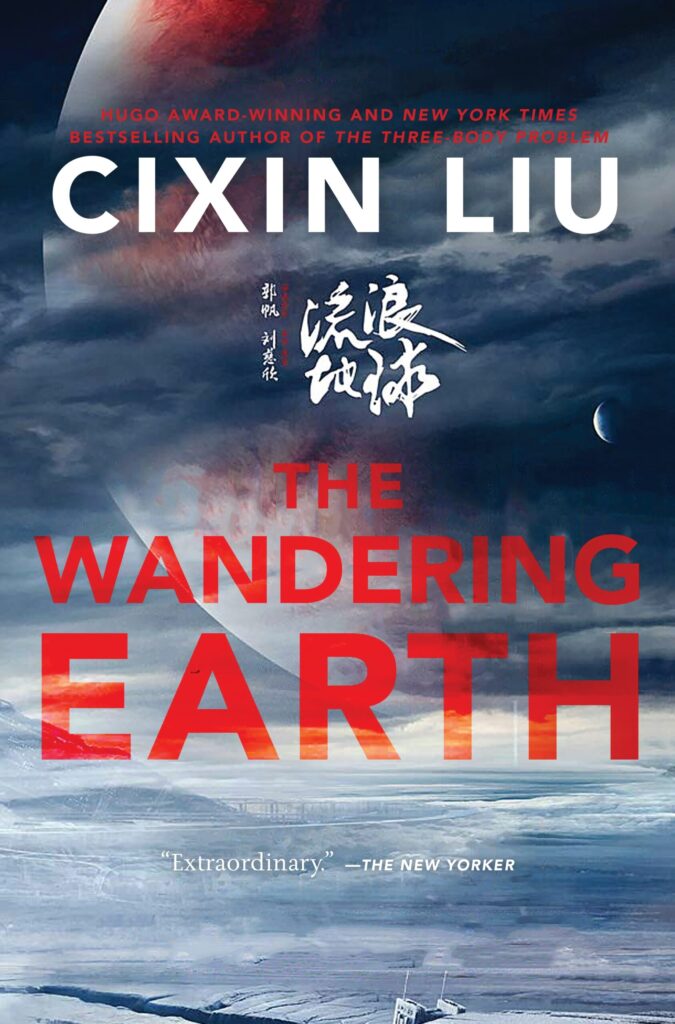THE WANDERING EARTH

by Cixin Liu
TOR Books
(www.tor-forge.com)
2013, 2021, 447 pages, $28.99
ISBN 978-1-250-79683-7
Click Here to Purchase
In Liu’s collection’s title story, an impending disaster of the earth’s sun unites the planet’s warring factions in a single task: propel the earth to a home in goldilocks orbit at the nearest star system, Alpha Centauri. The planet, in its thousands-of-years journey, will suffer endless environmental catastrophes. But will spaceship earth and humanity survive?
Other stories make this a blockbusting collection of super science, colliding-worlds space opera:
· “Mountain.” A large planetoid-like structure arrives on the oceans of earth. A great swimmer goes to meet the possibly intelligent life form inside. What is the history of the solid-rock sentience?
· “Sun of China.” This is the story of a common-boy-turned-adult-superhero by the name of Shui Wah, who comes to know the inventor of a silver, reflective sheet of material that is used in the highly ambitious China Sun Project to bring ecological transformations to parts of China that need it, and perhaps to the world at large. The mirror material is used to create a large solar reflector in space called the China Sun. The sun needs window/surface cleaners, like a skyscraper needs window cleaners. But after its use, can the China Sun be repurposed as a multigenerational space vessel? What does the window cleaner Shui Wah hope to accomplish?
· “Curse 5.0.” What hath the “Internet of Things” wrought? Computer viruses of different types will, of course, not only haunt and help to destroy civilization, but also alter any of our plans to prevent the inevitable transformation of all living beings.
· “The Micro-Era.” Eventually the ecosystem of earth will decay and die, and humanity will strive to reach the stars for habitable planets, to no avail. One ship returns, after its millennial-long journey, to earth, to find it inhabited and controlled by tiny “micro-humans.” How the micros came to survive transforms the one “macro-human” who has returned to earth.
· “Devourer.” Humanity meets a visitor from Epsilon Eridani who warns earth of the approach of a “planet eater” called the Devourer. The Captain, head of United Nation’s Security, tries to come up with a plan to defeat the civilization-destroying Devourer empire, until a Devourer ship arrives bearing its commander, “Faingsh,” whom humanity refers to as “Fangs.” Emissary Fangs says the Devourer ship, all 30,000-kilometers wide of it, will arrive, and they desire to carve humanity, nice carbon-based entities, into food. This incredible story of colliding worlds and super-science gets pretty space-opera-like, as the Captain comes up with a plan, one that he thinks is airtight. But destiny has other ideas in mind.
· “Taking Care of God.” Suddenly thousands, perhaps millions, of spacecraft appear in the skies at once, lowering to the ground old, decrepit humans who purport to be the long-forgotten, speed-of-light, traveling and carefully life-suspended ancestors of humankind. They are on earth for one purpose: to peacefully live out their remaining days. But taking care of elders — who happen to have lost their knowledge of their own technology to the ravages of some 3,500 years — becomes a terrible burden to earth’s citizens. While these elder gods have saved humanity time and again, humanity has taken them for granted. This story is an allegory of elder care about our current situation on earth, people living long on next-to-nothing in the way of global and national resources. What are we to do with the elders among us?
· “With Her Eyes.” Technology has advanced so that we can see what others experience. For one terranaught on a voyage to the earth’s core, it is an open, green space she yearns to see, cramped up in her tomb of a world as the core-ship deals with a series of near-destruction accidents thousands of kilometers beneath the planet’s surface.
· “Cannonball.” Engineer Shen Huabei, diagnosed with terminal leukemia after his experiences in nuclear research, goes into hibernation until a cure can be found. He leaves behind a mother (Zhao Wenjia) to their son (Shen Yuan), who has ambitions as the inventor of the Antarctic Doorstep Project, a corridor straight through the center of the earth, from China to Antarctica, opening eco-industrial vistas for China and perhaps the rest of the world. When Huabei is revived and cured of his illness, a cadre of assassins capture and jail him, to make him pay for the doings of Yuan. Sentenced to die, Huabei is tossed into the tunnel, only to be rescued by police, but the voyage for Huabei is far from over.

